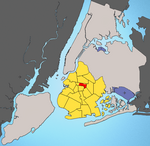Sterling Street station
1920 establishments in New York CityFlatbush, BrooklynIRT Nostrand Avenue Line stationsNew York City Subway stations in BrooklynNew York City Subway stations located underground ... and 2 more
Railway stations in the United States opened in 1920Use mdy dates from June 2017

The Sterling Street station is a station on the IRT Nostrand Avenue Line of the New York City Subway. Located in Prospect Lefferts Gardens, Brooklyn at the intersection of Sterling Street and Nostrand Avenue, the station is served by the 2 train at all times and the 5 train on weekdays.
Excerpt from the Wikipedia article Sterling Street station (License: CC BY-SA 3.0, Authors, Images).Sterling Street station
Lefferts Avenue, New York Brooklyn
Geographical coordinates (GPS) Address Nearby Places Show on map
Geographical coordinates (GPS)
| Latitude | Longitude |
|---|---|
| N 40.663061 ° | E -73.950863 ° |
Address
Sterling Street
Lefferts Avenue
11203 New York, Brooklyn
New York, United States
Open on Google Maps





